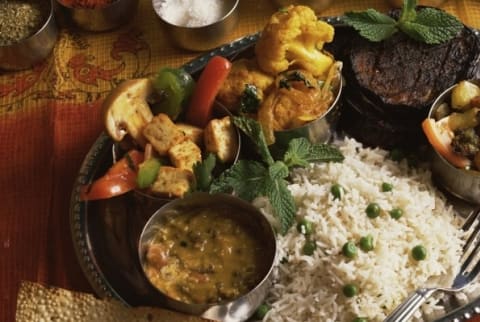Advertisement


I distinctly remember getting off the plane in Chennai, India for my first overseas position with American Jewish World Service. I was 28 years old, it was 3 in the morning and the NGO forgot to pick me up.
I sat on the curb for an hour and half, waiting for my ride. Strange as it sounds, it was one of the happiest moments of my life. I'd followed my instincts and headed overseas to work; that was 10 years ago.
One of the most surprising, healing benefits of my international aid work is how it's impacted the way I think about food.
I've seen a lot of people suffering from hunger, malnutrition, etc. — and I don't want to trivialize that suffering by writing about my privileged experience.
I do, however, believe that life is filled with learning experiences and what I've learned in these countries could be helpful to anyone, regardless of where you live. You don't need to move to Chennai to create more positivity around food!
Here are three things that changed for me once I left America and three ways you can make similar changes without leaving home:
1. No more food chatter
At home, I was surrounded by people just like — people who were food scared, food crazy or food fighters (you know, the people who shame you for eating bread.)
But life in a new country replaced those conversations with talk of different, more important things. Looking back, I can see how all the talk about food just created a lot of anxiety.
How you can do this at home:
You get to control what you talk about and who you talk to; you can chose to remove food anxiety and neurosis as conversation topics. If someone brings it up, politely redirect the conversation. If you have a particularly food-obsessed friend, schedule activities with them that aren't related to food — a yoga class, a long walk, a concert.
2. Meat, fish and dairy as condiments, not the focal point of the meal
In America, we think nothing of eating an eight ounce steak for dinner or a cup of Greek yogurt for breakfast. But in many developing countries, people use these same foods as flavoring agents and their meals are healthier because of it. They top vegetable-filled pho with a small handful of shredded beef or top their curry with a dollop of yogurt. In many of these countries, these dietary decisions are based on financial, cultural, or religious constraints, but we could all probably benefit from eating slightly less meat and dairy.
How you can do this at home:
What if you went meatless for one meal each week? Or topped your salad with a beautiful baked yam instead of cheese? Or made your tacos with heaps of roasted vegetables and just a bit of shredded chicken? It's healthier, cheaper and just as delicious.
3. Meals as a resting place
In America, cooking and eating were rushed functional activities for me. Too often, I ate alone or standing up or at my desk. I snacked in the car, drank my calories or ate superfood snacks instead of meals.
But once I moved away, I was forced to sit down and rest my body and mind while I ate. I now share meals with others. Meals are a resting place for me. Meals are now emotionally nourishing for me.
How you can do this at home:
Making meals emotionally nourishing looks different for everyone; you don't need cloth napkins or meditation music! I make my meals restful by making them slow, intentional and social. I sit down while I eat, take my time while I cut vegetables, ask my family to help me cook and even light a candle at the breakfast table. I do all this because it feels better; it makes me feel calmer and more connected.
That night I landed in Chennai I had a lot of expectations.
I expected to be challenged.
I expected to learn.
I didn't expect to heal my food issues — but I'm so, so glad I did.